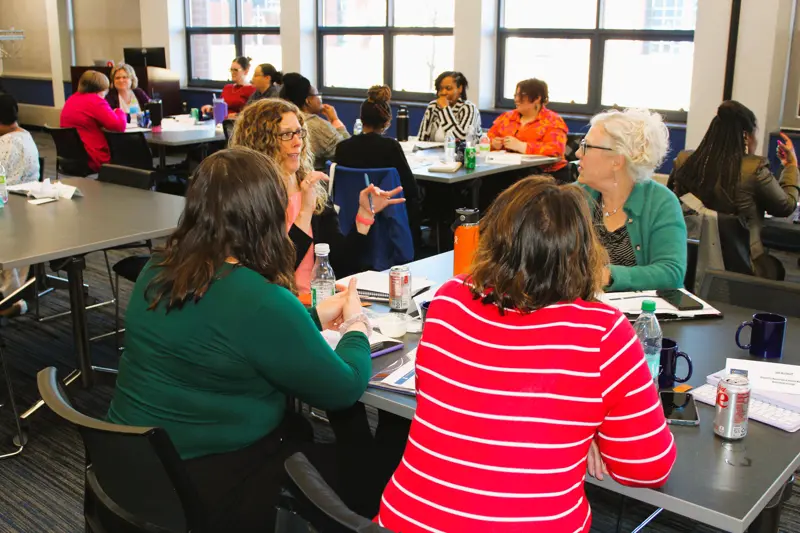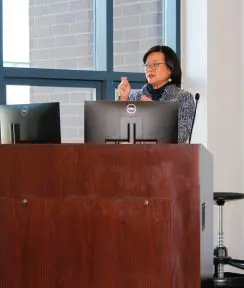On February 28, the Office of Community College Research and Leadership (OCCRL) hosted its spring 2025 Equity Academy at Heartland Community College in Normal, Illinois. With a theme of “Pathways to Equity: Redefining Student Success in Unique Times,” the event brought together educators, institutional leaders, researchers and policy advocates for a day of reflection and discussions around issues of equity in higher education. The event focused on redefining what student success means in increasingly complex social and political landscapes.
The Equity Academy opened with a welcome from Keith Cornille, president of Heartland Community College, followed by remarks from Jennifer Foster, the deputy executive director of the Illinois Community College Board (ICCB). The keynote address was delivered by Dr. OiYan Poon (at left in photo), co-director of the College Admissions Futures Collaborative at the University of Maryland, College Park, and a faculty affiliate member of OCCRL. Dr. Poon’s talk provided a powerful exploration of how those in higher education systems can reimagine institutional norms to create inclusive and equitable learning environments.
Drawing from her extensive research and policy work, Dr. Poon explored the current challenges facing educational equity in the U.S., particularly in the context of increasing legal and political tensions. She called for continuing to bend the "arc of the moral universe" toward justice, invoking historical and moral imperatives to act courageously in defense of equity and democracy. Her presentation referenced recent state-level actions, including Illinois legislation (P.A. 102-1046), emphasizing that executive orders and administrative letters lacking legal force should not derail equity efforts. Dr. Poon provided examples of collective support among institution leaders while encouraging attendees to stay the course as they work to close equity gaps.
Following the keynote address, Dr. Lisa Castillo Richmond, the outgoing executive director of the Partnership for College Completion (PCC), offered reflections on the state of equity in higher education and the work that remains. Dr. Castillo Richmond discussed PCC’s Illinois Equity in Attainment Initiative (ILEA), which supports 26 colleges and universities that are working to close racial and socioeconomic disparities in degree completion. Her talk emphasized the power of institutional accountability and sustained partnership to drive change in higher education.

The event transitioned into small-group activities facilitated by OCCRL collaborators Dr. Osly Flores and Jewel Bourne. During these sessions, participants revisited core concepts and concerns, contextualizing racial equity through a multitiered approach that examined equity consciousness across macro, micro and institutional levels. Their discussions focused on scenario planning and assessing impacts as well as uncertainties, responses and alternative plans. The consensus from these talks was that committing to frequent, frank and sometimes difficult talks about the racialized climate for minoritized students is important, as is investing in culturally responsive practices. Participants concluded this portion of the day by reflecting on the importance of understanding and implementing racial consciousness to achieve equitable experiences and outcomes for students.
The afternoon resumed with a large-group discussion facilitated by Dr. Lorenzo Baber, who guided participants through a collective reflection on the importance of embedding equity as a core value of the comprehensive local-needs assessment (CLNA). Emphasizing the connection between CLNA work and equity plans, participants discussed how centering equity through committee work means ensuring that a diverse coalition defines, understands and commits to principles of inclusion and justice in distributing educational opportunities and outcomes for student success. Participants reflected on how individuals from different backgrounds, experiences and perspectives must give special attention to data that identifies marginalization and disparate results as well as systemic barriers that contribute to inequality, in contrast to assuming deficit perspectives of students and their communities.
Participants also discussed how to integrate CLNA findings into their institutional Equity Plan, as required by the Thriving Illinois: Higher Education Paths to Equity, Sustainability, and Growth strategic plan. CLNA highlights key equity issues, the group said, and stressed the importance of distinguishing disparities specific to career and technical education (CTE) from those reflecting broader institutional patterns. Given the centrality of CTE at community colleges, school leaders acknowledged that institutions must embed specific concerns and collective issues within a comprehensive Equity Plan. Finally, participants highlighted the necessity of committing to continuous improvement by revisiting CLNA consistently, updating the Equity Plan as needed and refining strategies based on evaluation and feedback.
Following the event, attendees provided suggestions on topics they would like to see in future Equity Academies. Many expressed interest in hearing success stories from schools within their local areas. Another suggestion was reviewing promising practices and logic models from other institutions to better understand what strategies are effective and how their impact is measured. There was also an interest in obtaining detailed examples of strong equity plans, specifically in relation to how institutions are actively closing equity gaps.
Participants also emphasized the value of idea-sharing opportunities that could help them implement diversity, equity and inclusion (DEI) activities at their own campuses. Attendees from small and rural campuses conveyed the importance of exploring best practices for institutions that operate with limited resources. The potential impacts of shifting federal policies and funding decisions surrounding DEI initiatives were also voiced as concerns.
In addition, attendees stressed the need for including clear processes and practical tools and strategies to advance DEI goals effectively, particularly given the uncertainty in today’s environment. Participants asked for resources and support for efficiently disseminating findings from their CLNA, noting the substantial effort required to complete these assessments and the challenges of effectively communicating their results across departments.
Finally, participants asked for future discussions to directly address student homelessness, recognizing this issue as a critical equity concern that affects their campuses.
View photos from the event.
